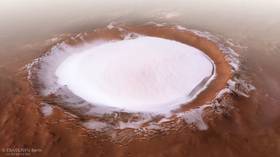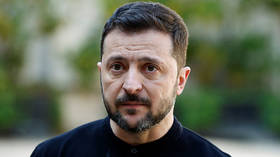‘Doctor, help me, I have ecological grief’: Climate scientists should stop depressing themselves (and us!) with made-up disorders

I’m not surprised that some climate scientists claim that they suffer from a new mental health condition called ‘ecological grief’. These days you draw attention to your cause is by highlighting the emotional pain you suffer.
A label in search of victims
The Guardian reports that researchers are forming ecological-grief support groups online to “share their feelings.”
Scientists reporting their sense of environmental loss, self-consciously come across as mental health patients in search of coping strategies.
Professor Steve Simpson, a marine biologist at the University of Exeter, argues that it is essential to find ways of sharing ecological grief and “work together to support each other.” Another researcher, Ashlee Consolo, explains that ecological grief is “certainly painful” and “it can be terribly isolating” for “it can be a really horrible experience.”
Also on rt.com Too flight-shamed to take a plane and can't afford a yacht like Greta? Hitch a week-long ride on a cargo shipSupporters of the problem of ecological grief define it as “the grief felt in relation to experienced or anticipated ecological losses, including the loss of species, ecosystems, and meaningful landscapes due to acute or chronic environmental change”.
A close inspection of this definition and the arguments supporting it suggest that this is a concept in search of potential victims. It is an aspirational concept that invites people to feel an emotion that they either lack or have not yet acknowledged.
Its proponents complain that “ecological grief, and the associated work of mourning, experienced in response to ecological losses are often left unconsidered, or entirely absent, in climate change narratives, policy and research”.
The authors of the statement do not consider the possibility that the reason why ecological grief is “entirely absent, in climate change narratives” is because it has little relevance for normal human beings.
Possibly, the purpose of raising awareness of this sadness that people don’t realize they even feel is to make them feel guilty and bad about failing to participate in a ritual of mourning.
Medicalizing normal human concerns
There is a more precise way of explaining the meaning and use of the term ‘ecological grief’. In a different world, the reaction described by Simpson and Consolo would have been characterized as a form of existential distress that human beings experience in response to upsetting events.
In the 21st century, such difficulties are increasingly recast in a psychological vocabulary to the point that virtually every problem is accompanied with a mental health diagnosis.
People who are shy are described as suffering from social phobia. Kids who argue with their parents and teachers find themselves labelled victims of ‘oppositional defiant disorder’. Students at university who are worried about their impending exams are frequently labelled as suffering from exam anxiety or exam stress.
Also on rt.com Scientists say ‘invisible aliens’ live among us. Revolutionary discovery or proof that too many useless academics live among us?Environmental activists have been at the forefront of medicalizing the issues that they promote.
From their perspective, the problem is not simply the degradation of the environment, but its impact on the mental health of concerned individuals.
Ecological grief is not the only mental health condition invented by environmental activists. Arguably, ‘eco-anxiety’ is the most fashionable mental health condition promoted by environmental campaigners. One reason why eco-anxiety has gained such traction in the green milieu is because it is said to afflict children. And children always attract the attention of the public.
There is growing discussion about a supposed eco-anxiety epidemic.
Reports of an epidemic of eco-anxiety are not backed up by any serious statistical evidence. “No stats are available on the prevalence of eco-anxiety, but some experts have noted an increase in public anxiety around climate change,” notes an article on the subject. Susan Clayton, who co-authored a report titled ‘Mental Health and Our Changing Climate: Impacts, Implications, and Guidance’, speculates: “We can say that a significant proportion of people are experiencing stress and worry about the potential impacts of climate change, and that the level of worry is almost certainly increasing.”
That’s another way of saying that we are making things up as we go along.
Also on rt.com ‘We are the woke’: Joaquin Phoenix joins Jane Fonda at DC climate protest, to preach about meat & dairy and flight-shame himselfThe project of medicalizing people’s reactions to environmental problems plays a significant role in the playbook of environmental crusaders. Through the diseasing of people’s reactions to environmental problems, activists seek to humanize and personalize their catastrophic view of the world. Reports of scientists suffering from ecological grief invite people to react to environmental problems in a manner that is analogous to the sense of mourning they experience in response to the loss of a family member.
Damaging children with your panic
The invitation to feel a sense of ecological grief has the perverse effect of making people feel more vulnerable and insecure. Its corrosive influence is particularly damaging to the lives of young people.
The normalization of grief and the cultivation of emotional anxiety disorients the young and renders them passive in the face of the challenges they face. No doubt, the scientists involved in ecological grief support groups genuinely believe that they are suffering from a new mental health condition.
But unwittingly, they are inciting the young to feel insecure and anxious. Unfortunately, instead of acting as problem solvers, scientists obsessing about their ecological grief become part of the problem.
In the current climate, an aspirational idea like ecological grief can easily be integrated into the reality of Western culture.
Also on rt.com Meat Loaf slams ‘brainwashed’ Greta Thunberg, says she was ‘forced’ into climate change beliefEco-alarmism has become a constant feature of the media. Eco-doom and eco-anxiety are regularly communicated through programs that encourage the audience to embrace a perspective of imminent catastrophe.
This theme was most powerfully captured by the HBO series ‘Big Little Lies’. In one episode, it featured a scene where the daughter of one of the main protagonists has a panic attack in school after being constantly subjected to a series of climate scare stories by her teacher.
The teacher has no doubt that through stimulating the concern of eight year-old school children, he is performing an important public duty. When it is OK for teachers to scare children, it is not surprising that we are all encouraged to publicly declare our grief for the environment.
The statements, views and opinions expressed in this column are solely those of the author and do not necessarily represent those of RT.
















